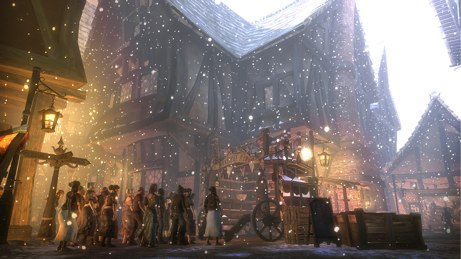Eyeless Max: Dragonball

by Toku

by Toku
There were a couple news pieces about Detroit and the $100 home, following the Toby Barlow piece in the Times. Here’s one from ABC, and one from CNN.
Short version: artists are moving into Detroit, attracted by the low prices on vacant and gutted houses ($100-$3,000). These are houses in Hamtramck, which is still partially inhabited; it neighbours Highland Park, which is where Gran Torino was set. There are neighbourhoods in Detroit that are much, much worse.
I’m no expert, but the Anderson Cooper piece especially feels naive. Of course Gina Reichert and Mitch Cope will one-sidedly promote the opportunities in their neighbourhood. But at least ABC draws out the arson threat they had received. Remember that Detroit police can take 24 hours to respond to a homicide call, and realize you would have to gun up pretty hard to defend your nice new pile of wreckage. That said, a $14/month mortgage sounds pretty good right now. (via detroit unreal estate agency)
There are two big risks this game runs. First, as the first Halo game not developed by Bungie Studios, it could tarnish a well-made games property and piss of fans by, you know, getting things wrong. Secondly, an RTS on a console is inherently risky. RTSes are generally PC games, reliant on keyboards and mice to navigate large numbers of units quickly, and while the Great Console RTS has certainly been attempted, it hasn’t yet been perfected.
Halo Wars comes close enough for most of us. For Halo fans, it provides a solid dose of Halo story and world. The characters are generic, but the cutscenes incredibly well made. The additional units for both UNSC and Covenant (love the locusts!) fit well into existing Halo lore.

A Locust, the Scarab’s little cousin
As for RTS lovers, there’s something to like here as well. Ensemble Studios simplifies the RTS formula, forgoing the resource gathering and cutting out the ability to define and control groups of units. But the rest of the game is solidly traditional: the cursor, the overhead view, the base-building all signify a simplified yet still complex strategy game with plenty of possible routes to victory – or humiliating loss.
Halo itself is a redefinition of a PC genre for the console – the shooter. So I had hoped for perhaps a more radical redefinition of real-time strategy for the console with Halo Wars. Ubisoft’s recent EndWar presents a near-flawless voice control system. Bungie Studios have themselves made an RTS, before Halo, with Myth. That game did away with the base-building altogether to concentrate on combat, and it worked very well.
Halo Wars makes no radical moves, but is still good, clean, addicting fun. If you’re into a) Halo, b) RTSes, or c) all of the above, you should get on it.

Was happy to see Toku hasn’t forgotten Eyeless Max n’ friends. It’s been a while.
Did a little mashup action here: Led Zeppelin vs. Silent Hill.
Two things recently. #1 was EndWar, a console real-time strategy game by Ubisoft that allowed for voice control of your units. It worked near-perfectly, and made a hell of a lot of sense. There have always been issues getting RTSes working on consoles because they are complicated PC games that are mouse-and-keyboard centered, and they tend not to work well on console controllers. EndWar just routed the fuck around that. After all, RTSes are games about barking orders at soldiers, and a mouse is a pretty arbitrary substitute for actual barking.
The second thing is the Google Mobile app on the iPhone. Despite it being developed by Quicksilver master Alcor, the first version wasn’t all that thrilling. The next major revision added voice search – hold the phone up to your ear, wait for the beep, and speak. However, I put it aside after a few failed queries. I’ve tried it again, though, and I think they’ve improved things on the server side because it actually works. It even managed to get “CRTC” right, which surprised me. Like the Shazam audio recognition app, it’s one of those head-turner iPhone features, but unlike Shazam, I actually use it all the time.
Both of these things are examples of using voice instead of keyboards in contexts where a keyboard is pretty sucky. No one wants to have a keyboard lying on their lap when they’re sitting on the couch, and similarly why mash tiny fake buttons on your iPhone screen when you can use your face to say things. Obviously they are also hugely dependent on audio pattern recognition algorithms and AI having advanced to a sufficient state. But what they signal is that they have indeed advanced, and we can now talk to our computers, and more often than not, they will actually understand.
On the other side, computers have gotten better at talking to us. Take the new Shuffle, released yesterday, which will tell you the song you’re listening to. Or, the Kindle 2, which will read your book to you. Sure, text-to-speech has been around a while; ask any Mac owner. But the new voice in Leopard beats the hell out of all the old ones, and judging by how computer technology has been progressing, I’d wager the voices will only get better.
I’m convinced that this means big things. If something can easily be turned into text from voice, that means that it can easily be searched. The new Google Voice will allow transcription and then tagging and searching of voicemails. Now imagine recording everything you say, and everything anyone says to you, and being able to search it. It’s not so far off – borderline achievable today with an iPhone, a 3G connection and something like Jott (unfortunately, the way-cool Jott has gone pay-only).
I can’t help but think about the storytelling potential for such technology, namely games. It’s not just bossing units around. Imagine no more dialogue trees and menus and simply engaging in natural language coversations with AI characters. It wouldn’t just be for RPGs; suddenly a game could exist where the central ‘gameplay’ is just conversation. Conversation is obviously central to human life and is something film, TV, novels, every other sequential art form can render in a manner befitting its medium, which is not true of games right now.
Finally, the shift is ultimately about the disembodiment of computers, paralleling the rise of cloud computing. Sure, we interact with plenty of disembodied computers already, like when we get up in the internets. But we do that through our desktops and laptops. As our computers get smaller – phones, pens, etc. and more ubiquitous, it’s increasingly archaic to interact with them only through screens and keyboards. They will become magic ghost butlers, like HAL (except hopefully less killy).
Next: a smell-based operating system.
This is a station ID I did for Drive-In Classics a couple years back. It aired late at night as a treat for stoners.
Wish I could name all the sources, but at the very least it’s Beach Party, Vanishing Point, a kung fu flick, and VO from some shitty old trailers.
This Is It from dsankey on Vimeo.
I watched both the original and the remade Friday the 13th last weekend; I had never seen either. The remake was pretty meh, as could be expected. The original was surprisingly shitty. It’s essentially plotless until the end, when there’s a twist. But it’s not like the twist is especially powerful, since you don’t give a shit about any of the characters.
You may have heard Psycho described as the godfather of slasher cinema, and Friday the 13th seems to be the missing link, as it’s heavily indebted to Psycho. Not to say it’s Psycho-good, it’s just clearly very much inspired by.
The film has a moment of beauty, though, right at the end. And it comes with some beautiful music. I felt inspired to do a little chop-up job on both, and here it is.
He’s Still Out There from dsankey on Vimeo.
So we decided to check out Toronto’s new dedicated poutine restaurant, Smoke’s Poutinerie.

First off, this joint is popular. This is my second time going, or rather trying to go – the first time I went with a couple friends, we turned away empty handed due to the lack of seating and wheelchair accessibility. It’s got seats, it’s just that they were all full, and they were this time, too. But it was a lunch expedition, and we just took our gut-busting lard-based treats back to work and ate them there.

This is a quality poutine, no question. The fries are excellent, the gravy a nice, mild chickeny sort, and the curds authentic. The proportions – a crucial equation that has destroyed many a lesser poutine – are perfect. You can select from a number of variations, including the usual Italian and smoked meat varieties; I went with the meat-crazed “Hogtown” (bacon, sausage, onion and mushroom – while most everything in this life can be improved by adding bacon, just this once I do regret not going with a plain one to get a clearer taste of the essentials).
It’s $7 for a plain-vanilla poutine, and variations run to $8 or $9. Your cholesterol bomb comes nicely packaged in a brown cardboard box. I won’t say this is the greatest poutine I’ve had – this is it here – but it’s definitely good shit (as one would expect from a place that makes nothing but poutine).
Here’s the problem, though. Poutine is a terrible take-out food. Mere moments after the gravy hits the fries, it is waging a guerilla campaign against crispiness, and perhaps 15 minutes later, you are in a quagmire of mush. We had only a five minute walk before we could sit down and start destroying our arteries, and already the integrity of our poutines had been compromised by the inexorable pairing of time and gravy. The reasonable response to this is to get the gravy on the side, something Smoke and the gang should strongly consider. If you visit Smoke’s and it’s rammed to the gills and you cannot immediately pounce upon your Quebecois prey, ask for it that way.
During the gorging session, and before the gravy coma hit, it came up that the word on the street is that the best poutine in Toronto – nay, all of Canada! – is from one of the chip trucks out front of City Hall. Gentle readers, an expedition is assured, but it may wait until fairer weather enables on-the-spot feasting. And so until then, this poutine reporter must sign off.
Do yourself a favour and check out my friend Gord’s masterful Klingon Night School spot. And give him a vote in the showdown – I hope you’ll agree he deserves it.
Full disclosure: I may or may not be a klingon in the above video.

And he can ROAR.
Mmmmm.
I’ve sampled two recent real-time strategy games on the 360, Tom Clancy’s EndWar (also available on the PS3) and the demo to Halo Wars.
RTS is a genre born on PCs that rarely works on consoles, despite many noble attempts. The key problem is control. There simply aren’t enough buttons on a console controller, and something designed with rapid mouse movements in mind doesn’t necessarily translate to analog sticks.
EndWar presents a possible solution to the control problem: voice control. Using a simple subject-verb-object palette of grammatical chunks – “unit one attack hostile two” – it’s possible to fight a battle without using the controller at all. I played through the bulk of the single-player campaign this way, and it works surprisingly well, with maybe 90% accuracy. Sometimes, you wind up using the controller because it’s quicker. But voice control is not only more graceful, it’s actually more true to what the game is simulating.
Unfortunately, EndWar has little else to offer. The missions are all the same and the difficulty curve leaves a lot to be desired. If there’s ever a sequel, it could theoretically kick ass, though.
The Halo Wars demo has only two levels, so it’s hard to judge the game at this point. But what you are presented with is a slick, carefully packaged narrative experience with simple, almost casualized gameplay. The control is traditional for console RTS – the left stick controls your cursor, and so press one face button to select units, another to give them a target. The levels required very little actual strategy. You could beat them without anything other than ‘select all units’, and so the feel was more like an action game with a little base-building than an actual strategy game.
Not to get all Sun Tzu here, but that’s a problem with console RTSes. Because the control is a lot harder and slower, the developers can never assume you’ve figured out how to command more than one group at a time, and so the combat never requires much in the way of strategy. A certain level of difficulty is required for strategy games to make sense. It’s not just the usual rock-paper-scissors system of unit strengths and weaknesses, it’s feinting, luring, splitting the defence, etc. Select all and attack isn’t really a strategy.
After watching an “Inside Xbox” video about Halo Wars (which seems to be a console exclusive, so I can’t share it with you) I can say that the potential for more advanced control is certainly there. The developers seemed to have thrown a bunch of possible control schemes at the wall in hopes that one or more actually sticks. Problem with that is the controls can get confusing. I think that Lord of the Rings RTS (Battle For Middle Earth? MiddleWar? Lord of the Wars? EndFrodo? can’t remember what it was called) had a much touted control scheme, and you could in theory assign groups and send them this way and that, but in the heat of fake battle I could never remember how to do it.
Time will tell. I’ll almost certainly buy Halo Wars, if only go get a fresh dose of Halo story action. Let’s hope the controls work out.
Ah, Mr. Show. (via)

Wow, have I really taken this long to post this here? Musical alter-ego Snake Eyes has released an EP. Grab that shit. If you like hip-hop and country, your idiosyncratic tastes are to be commended, and you should totally listen to this album. It’s free for what may well be a limited time – I just ask that you subscribe to the Snake Eyes RSS feed, which will undoubtedly be pretty low-traffic.
We already build incredible, vivid places, but feel the compulsion to pave over them with our attempts at compulsory pre-authored story structures. In embracing the immersion model of meaning, one’s approach would shift away from building games around a core of Hollywood-style narrative, and toward building unique, convincing, open, integrally full gameworlds, populated by intriguing people to meet and things to do, and providing the player with tools of meaningful self-expression within that context that he might return changed by his experiences.
In my view, this is not to say that narrative does not exist – far from it. Narrative would be tied to places and people and dispersed about a map. It is also far from an abdication of authorial control – it’s less controlled, but the author still creates the architecture that the player explores.
“Meaningful displacement” is another excellent turn of phrase.
This is a simple but effective time-saver if you use your Mini for the downloadin’ and find yourself checking in frequently to see if your downloads are complete yet.
The notifier preference pane Growl can be set up to send an email instead of showing a little notifier box on your screen. Amongst other things, BitTorrent client Transmission and also Hazel work with Growl, so you can get email updates letting you know when files have finished downloading, and confirming they have been processed by Hazel.

Hazel is a preference pane that watches folders and carries out actions on files based on rules you set. It’s presumably stuff that you could do with folder actions and applescript, but for non-scripters, it’s handy as heck. It can take a while to get your head around, and figure out the right rules you want, but once you have it set up, you can automate a lot of the fiddly file management that comes with digital media. I have mine set up to watch my downloads folder and do the following:
It doesn’t work perfectly – Plex etc. can be fussy about filenames. However, it cuts down on the fiddling drastically. The auto-iPhone-updating alone is worth the $22.
There’s a few things to dislike about the game. One’s first impression is that it has been cripplingly casualized. You follow a glowing trail to where you need to go, and mash a button to fight. The setting is more or less standard ye olde RPG fantasie lande. The expression system – instead of talking, your mute character interacts with others via a radial menu of ‘expressions’ including ‘slap’, ‘whistle’, ‘fart’, ‘sock puppet’ – is corny as fuck. And then pick any number of minor frustrations, like long loading times, laggy and clumsy menus, the confusing map (or lack of map), and serious bugs like vanishing NPCs, empty stores, and even wholesale freezing and game save corruption.
But here’s the rub, and OK, I can’t resist a Fallout comparison here. Fallout 3 is a game in which you can do anything you want, as long as what you want to do is crawl through dungeons and shoot cockroaches. Fable 2 is a game where you can do any number of things. Time to pray to the god of the unordered list – you can
This is to say nothing of the things that you can do that have no benefit to your character, the sandboxy moments that are too numerous to list. In total, the things you can do are limited, and the complexity of each of the things is also limited, but the developers have found the ideal cocktail – it’s enough depth and complexity that the world becomes almost completely immersive in a way that sheer graphics can never provide.

For example, the simple button mashing of early combat becomes more interesting as you level up. You have three main attributes: strength, skill (dexterity) and will (magic). Combat, items and other phenomena will earn you experience in these specific attributes (using a lot of spells gives you magic experience), but also earns general experience that can be spent on any of the three. With your experience, you ‘buy’ increasing complexity, so strength improvements are be to attack damage, hit points, and a number of new melee techniques – the ability to block, then the ability to charge up a power attack, then the ability to counter an attack. Level up skill, and you will get faster, more accurate with your bow, and eventually you’ll be able to zoom and target specific body parts. With will, you have about seven different spell types, each with five levels of advancement. So what seems like button mashing eventually gives way to a system with a great number of tactical options. I settled on a system of summoning monsters to keep my enemies busy, while I attacked from afar, either with bow/gun or magic attacks.
Similarly, the corniness of the expressions hides a communications system that in many ways surpasses those usually found in RPGs. Despite innovations like the dialogue wheels of Mass Effect or Indigo Prophecy, RPG conversations are basically menus of text options. Fable’s expressions are more or less the same, but they move the dynamics of the conversation out of the realm of text and into your character’s physical actions – which is to say back into the game space, which is a Good Thing. There is a lot of depth, too, seeing as you can interact with any character in the game, and each has different personality characteristics which will affect their reaction to your character’s traits (good/evil, pure/corrupt, famous/not famous, good looking/ugly) and your expression choices (which are numerous). Sometimes this leads to hilarity, like when a character is terrified and also crazily sexually attracted to you – they might say, “how dare you massacre all those people. Let’s go back to my place and get to know each other better.”

There’s something interesting in all this, which is that it’s not necessarily realism that makes something immersive. Immersion may have more to do with a lack of things that take you out of the world. Every time in Fable that you imagine ‘what would happen if I do this,’ you get a result that stays true to the world. Take out your sword in the town square, and people will like you less. Remove bandits from a town’s environs, and real estate values will go up. This of course assumes a certain level of complexity for it to work, but more specifically it’s a bunch of game mechanics (combat, expression, economy, job, family, etc.) that each fall far, far short of being realistic, but all add up to something that at least feels like the diversity of action possible in the real world.
If you’re into “Big World” games, this is one you need to have a look at.
I’ve been falling behind with the series of posts about getting the most out of your Mini as a media center. I’ve made some tweaks, and figured I should share the joy. So expect a few updates in this vein over the next week or so.

Plex is my media center app of choice, and the recent versions introduce Harmony Universal Remote support, now with less fiddling. There’s a profile within the harmony setup app for Plex now, and it works well. Now I can put the Apple Remote aside and actually use only one remote. Sweet. Instructions here.
I have an unhealthy fixation upon robots, that ranges from the intellectual (I believe in the technological singularity) to the visceral (robots are fucking awesome, yo). I wear a small robot around my neck, a gift from my lady friend. I like all robots, from retro to Asimo, but I prefer giant, leaping robots – GERWALK motherfucker!
I work as a promo producer for the SPACE channel. (That’s how we rock it now, all caps.) A promo producer is someone who creates commercials for the shows and movies that air on that channel, as well as interstitials, show openings, etc. It is a job that demands writing, directing, producing, and (for my channel) editing, earning us the nickname ‘predators’. I have also developed the ability to watch shit with an eye for pithy taglines, explosions, and slow-motion dollies-in as someone turns their head and gives the horizon a determined look.
I listened to Rush today and fucking loved it. 20 minute songs, tempo changes, wizards and virtuoso drumming? I’m heading to Progtown and I may not be back for a long time.
I love to walk – I walk to work every day, which takes about 50 minutes. Not being a sportsman, and not much of a fan of gyms, it’s an effective way to get exercise, and with some new albums or a good audiobook (currently “The Universe in a Single Atom” by His Awesomeness the 14th Dalai Lama), it passes in a flash. Although it’s going to be -20 today.
When I was a child, one Halloween, I dressed up as “Squidlad,” a superhero of my own creation. Costume construction was contracted out to my father.
I have memorized the lyrics to “Let Your Backbone Slide” by Maestro Fresh-Wes. This is a throwdown, a showdown, hell no I can’t slow down.
I love laundromats. I don’t know why, but to me they are beautiful and magical places.
Via the funk comes a link that led to some interesting shit – this thread on Ask MeFi, in which the existence of houses for sale for the low four figures in Detroit and elsewhere, and the merits of purchasing same, are discussed. Up here in Canada the average house price is $300,000, so this was a jaw-dropper. Various points against such properties are discussed in the thread, but none says it as effectively as the keen eye of the lonely satellite:
These properties are in abandoned neighbourhoods, where most of the houses have been razed by the city, and those that remain have been stripped of their guts by scavengers. Your $3,000 buys a plot of land in The Road by Cormac McCarthy. This related thread on BoingBoing brings up a nugget of hope, which is “this house in an apparently decent, still-peopled area of Detroit”: – a five bedroom mansion for $57,900. That’s not to say it will actually gain value, which is an assumption we Canadians are used to making about pretty much all property. But it did spur a decent daydream, in which I purchase four mansions for the price of one tiny condo in Toronto.
If you really want to understand what’s going on in Detroit, you have to read this article from Harpers. Fortunately or un-, where Detroit has gone, may other North American cities will go, as we wade into the bleak seas of the post-industrial, post-car economy (post-economy?). The article ends optimistically, with farms sprouting from the slums. You could imagine that in a possible future, where the 50s flight of white people to the suburbs has been eclipsed by the flight of all people to the internet, and one’s physical place of work and residence has been rendered insignificant, these rubbly fields could again see houses built. Why pay big money downtown when you can do that work from a dirt-cheap dirt field in Detroit. But in the meantime, there are better things for the thousandaire to spend their money on.
As always, it’s the only time of year you are guaranteed to find a few good films in theatres. So I’ve been seeing a lot more, and it seemed time to do a roundup of films I’ve seen recently. Most of these are currently in theatrical release, but some are on DVD.
Curiously uneven, and my least favourite Fincher film. Features brilliant sequences sandwiched between southern-fried folk wisdom that had me LOLing, and not in a way Forrest Gump would have wanted.
Quite liked it, although I hear the play is much better, and the film introduces a number of historical inaccuracies. Great actoring, though.
I generally hate biopics, but van Sant turned in a decent one here. Politico-historically interesting, not so much artistically so.
This film has a number of great things going for it: fantastically vulnerable performances from Rourke and Tomei, a beautifully and authentically realized setting, generally good storytelling, and more than a few great bits of dialogue. It was critically wounded by a couple of broad, melodramatic strokes in the plotting. I kept on thinking of the Simpsons episode where the doctor tells Homer he can’t be shot out of a cannon any more.
High-five, Wackness. You killed it. I have little tolerance for highschool-slash-coming of age stories as we just see so many of them, but this one distinguishes itself with sharp writing, a great sense of humour, Real Human Emotion&trade, and Ben Kingsley’s best performance since Gandhi was the head of a gang or whatever. Perfect soundtrack, too.
A documentary following four b-boy teams competing in the “Battle of the Year,” and a straight-up awesome feel-good movie in the vein of Rize.
A doc of the “real-life freak” variety. Documents the iconoclastic life of a money-hating doctor who raises a family of eight completely outside the system, as a tribe of nomadic gypsy-surfers all living in the same camper. It’s a mind-opening meditation on the possibility of living outside the system.
Next I really want to see Synecdoche and Slumdog Millionaire …
I tend to prefer some narrative in my games, and this provides very little. I’m not a big fan of difficulty, and this has it by the dungeonload. I hate grinding, and this… well, you just read that.
I do love exploration, and this game – with its requirement that you make your own map – transmits perhaps the rawest delight in exploration I’ve experienced in some time. But then again, there are other games to try that would provide whole new worlds to explore, without the repetitive grinding.
There’s one instance at the end of the fifth floor where you face your first boss monster, Chimaera. I was about level 14-15 when I first tried to beat him, and he decimated my party. The online wisdom is that you should be level 18 to have a chance of beating him. That means you must grind up four levels, which is to say wander about the labyrinth repeatedly battling random monster encounters. This is more or less the same turn-based menu choice battle each time, against many instances of the same limited pallette of monsters. It could be a half hour, maybe an hour, of sheer repetitive time-wasting. Why? Dear Crom, Why?
Take a look at this article. Steven Poole argues that nearly all videogames present models of work, not play:
Possibly it is inevitable that, as products of decadent late capitalism, most videogames will, consciously or not, reflect the same values. You go through a period of training, and then it’s all about success and shopping, keeping your head down, doing what the system expects. Make-believe jobs, as Adorno and Horkheimer might have concluded, are the opiate of the people.
Understandably, Mr. Poole criticizes this play-is-work paradox and calls for a new model of gaming. Indeed, some of my favourite gaming memories from the last couple years are sandboxey, goal-free and open-ended (Crackdown and Halo 3’s Forge come to mind).
But ludologists would chime in that play and games are different things. Despite the phrase “play a game,” play is open-ended, whereas games must have rules, which means they will have similarities to work.
Over the past few years, I’ve come around to believing that we tend to use fiction as a form of practice for real life. When we watch a movie, say, we are evaluating characters and situations and imagining what we might do when presented with that situation in our lives. Would you do the things McNulty does in the final season of The Wire? If you knew a serial killer was afoot, would you really go into that dark basement alone? So it may not be the worst thing in the world for a game to be like work, if it is in fact training us cognitively to work better – work being an important aspect of real life, for good or for ill.
Poole quotes Mark Twain:
Work consists of whatever a body is obliged to do, and […] Play consists of whatever a body is not obliged to do.
So is “go to the store to buy a new video game” a type of work? I am obliged to do it if I wish to play that game. I don’t enjoy suiting up and venturing out in sub-zero weather, but I certainly will enjoy playing the game once I bring it back. So I’m willing to put up with the boring part because it will bring me the happy part. So it may not be a surprise that games like Etrian Odyssey contain ostensibly boring content that we enter into willingly. Indeed, the boring parts throw the fun parts into relief, making them more fun, as does the difficulty. If I had succeeded in defeating the Chimaera the first time around, it would have meant little to me, but since he had beaten me, and then I was required to work at improving myself, my ultimate victory meant much more.
Now to Outliers for a moment – not because I think it’s an awesome book but because it has a succinct definition of what makes work meaningful: “autonomy, complexity, and a link between effort and reward”. I don’t know if this is Gladwell’s own definition or someone else’s, but it makes sense. And it also makes sense of my Etrian Odyssey habit. I put in the half hour grinding because the satisfaction of defeating the monster will make the hard times worth it – “link between effort and reward”. Any RPG with multiple character classes, skills, and inventory management certainly has no problem with “complexity”.
But it is the “autonomy” that this game affords which most appeals. It does the minimum amount of hand-holding, rather expecting you to learn some of its inner workings. You have no pre-defined characters; you must evaluate and select from a list of possible classes, with a maximum party size of five. You could go into the game with one alchemist, or five troubadors – the game lets you decide how you want to rock it. You have your overarching main quest, which is map the labryinth, but it is handed out in sub-missions and supplemented with a great number of optional side quests. You can choose to take on the missions, or not. When it comes to leveling up your characters, and unlocking new skills, this is again left up to the player.
Choose a small team, choose your jobs, face adversity, choose how best to develop your team’s skills in order to overcome it – in the words of Jeffrey Lebowski, “challenges met, competitors bested, obstacles overcome.” This is a fantasy not about dungeons and monsters but about small business. It’s pretty much my idealized way of making my way in the workplace, and as a salaryman it is indeed a fantasy to me at the moment – no wonder I’m willing to indugle in it in my free time.